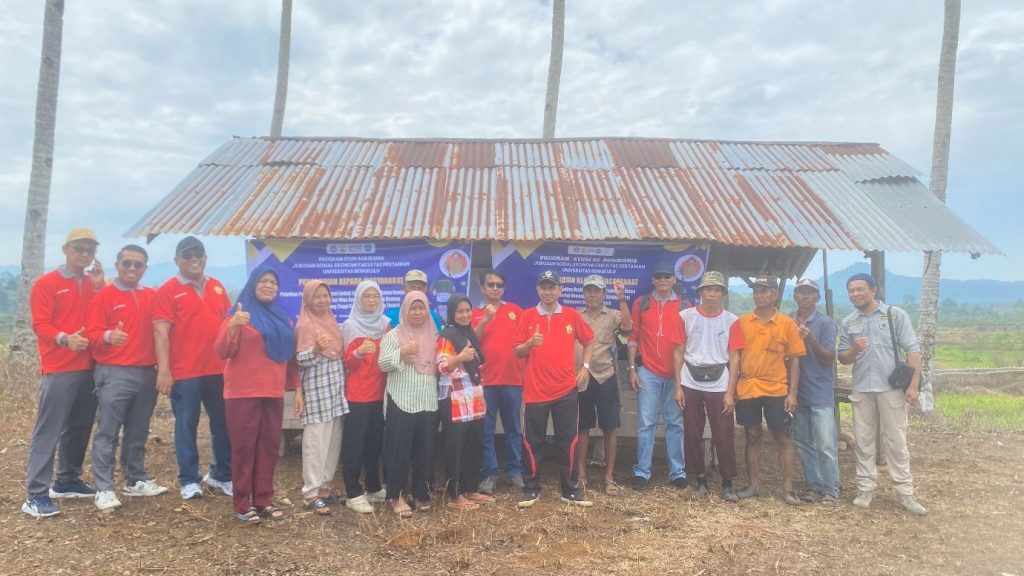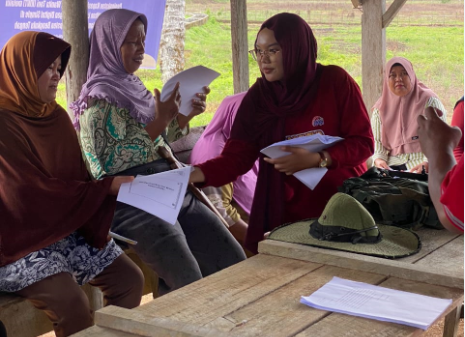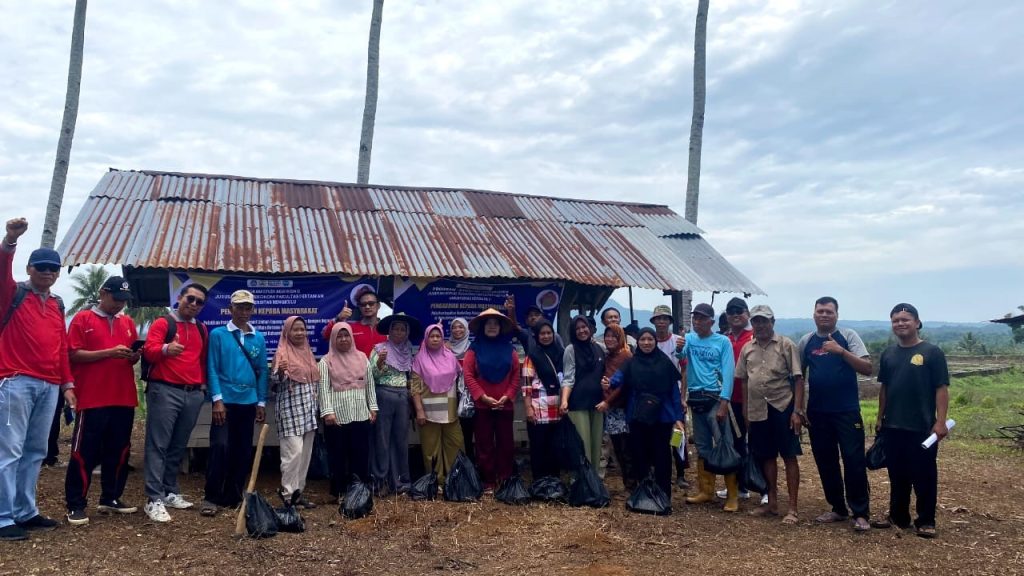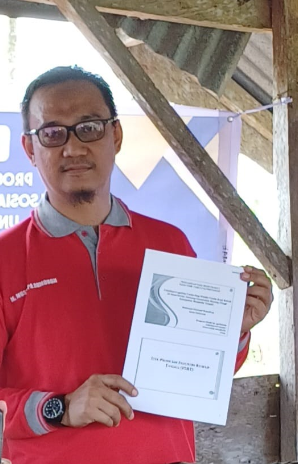
BUSINESS LEGALITY TRAINING FOR COFFEE GROUND BUSINESS ACTORS IN DURIAN DEMANG VILLAGE, KARANG TINGGI DISTRICT, CENTRAL BENGKULU REGENCY
The community service team from the Agribusiness study program, Faculty of Agriculture, University of Bengkulu held a Business Legality Training for Coffee Powder Business Actors in Durian Demang Village, Karang Tinggi District, Central Bengkulu Regency . Community service activities This was carried out in collaboration with the Karang Tinggi District Agricultural Extension Center, Central Bengkulu Regency, where in the working area of the Karang Tinggi District Agricultural Extension Center, the Farmer Group became part of the target of the service, namely as participants.
Identification of Training Participants
Participants of this community service program are farmer groups in Durian Demang Village, Karang Tinggi District, Central Bengkulu Regency. The criteria for farmer group members who can participate in training in this program are: 1. Farmers are members of the Duriang Demang Village Farmers Group, Karang Tinggi District, Central Bengkulu Regency , 2. Participants have the status of owner farmers, either male or female, from Duriang Demang Village, Karang Tinggi District, Central Bengkulu Regency, and 3. Participants must be present in person on the training day. Meeting between the community service team and participants to observe the conditions and problems faced by farmer groups so that steps need to be taken to resolve these problems.
Business Legality Training for Coffee Powder Business Actors in Durian Demang Village, Karang Tinggi District, Central Bengkulu Regency
The Legality Training for Coffee Powder Business Actors in Durian Demang Village, Karang Tinggi District, Central Bengkulu Regency began with the opening of the activity by the Head of the Farmer Group (Mr. Samari), Field Extension Officer (Mr. Ari Farizal, SP.) and the Head of the Implementation Team for Community Service Activities of the SOSEK Department, FP, University of Bengkulu (Mr. Rihan Ifebri, SP., MSi).

Members of this farmer group are generally rice farmers and secondary crops such as corn farmers, but a small number of farmer group members have a ground coffee processing business. The products produced are only consumed by themselves and/or served at village events and given to neighbors. Generally, ground coffee products are simply packaged in clear plastic packaging without a brand. This ground coffee product has a large market opportunity to be marketed outside the village, both as souvenir products and/or direct consumption products in stalls or sweet shops. Just like food products, ground coffee must meet food safety and health standards. These standards are set by government institutions or agencies, including the health department, BPOM, and the MUI halal agency. In addition, products that will be marketed to the public must have a business license and distribution permit from an authorized government institution or agency such as the trade and industry department. However, conditions in the field show that many members of farmer groups who have ground coffee processing businesses or other food processing businesses do not understand the mechanisms and requirements for the required business licenses. Therefore, this community service activity is very important to provide knowledge and insight to business actors, especially members of farmer groups who have ground coffee processing businesses or other food processing businesses Based on the agenda of activities that have been prepared, this community service activity begins 1) Community service begins with an opening and briefing at the office of the Karang Tinggi District Agricultural Extension Office, Central Bengkulu Regency. The location of the opening event is about 3 km from the community service location to the Karang Tinggi District Agricultural Extension Office or 25 km from the University of Bengkulu. The community service team coordinates in advance with the accompanying extension workers and members of the farmer groups, for their willingness to participate in the training that has been designed to achieve the program's objectives, namely changes in knowledge and skills. From this activity, it is highly expected that members of this farmer group have the ability and skills to prepare business licensing documents.

Presentation of material by Dr. Muhamad Mustopa Romdhon, SP, MSi
The material presented by the service team, namely Dr. Muhamad Mustopa Romdhon, SP, MSi, is described in detail as follows (see Figure 3). The number of farmers present was 13 farmers consisting of 7 male farmers (53.85%) and 6 female farmers (46.15%) (absence attached). Based on the results Initial evaluation revealed that 100% of training participants had never attended business licensing training and did not know about business licensing. Furthermore, providing training or capacity building for members of farmer groups that aims to improve the quality of human resources to be competent and professional, the training provided includes legal aspects, namely business permits. The material presented is about (attached material slides), namely Business licensing material includes the concept of business licensing, requirements and benefits. Definition of Permit Permit PIRT or Certificate Production Food Industry House Ladder (SPP housewife) is guarantee written to results production Housewife Which fulfil condition And standard security certain in frame production And circulation product food. In full are 1) Household Industry Production Permit (PIRT), 2) Having a Business Identification Number (NIB) document, 3) Preparation of PIRT permit application documents, 4) Submission of PIRT permit in the OSS Application, 5) Preparation of PIRT document submission, and 6) Printing PIRT Permit. General conditions that must be met include: 1) Following Counseling Security Food , 2) Fulfilling Condition Method Production Food Which Good For Industry House Ladder (SPP-IRT) or Hygiene Sanitation And documentation , 3) Fulfillment Provision label And advertisement food , and 4) Will carry it out in term time 3 month. Benefits The existence of P-IRT permits obtained by SMEs will provide benefits, in the form of products that can be legally distributed or marketed, product distribution channels will be wider, especially if they will be consigned to large stores (supermarkets), and the level of consumer trust will also increase. It is hoped that with these benefits, ground coffee businesses in Durian Demang Village will try their best and compete with each other so that their products sell on the market. Thus, the implementation of food safety will also increase. Evaluation of the level of understanding of participants regarding the service material was carried out by the service team by giving a number of direct questions to participants regarding the material. The results of the brief evaluation showed that the level of understanding of participants regarding the material provided was 60%. This means that around 40% of training participants needed time to understand the material well. After the delivery of the material and the evaluation of the service by the other service team. The service activity was officially closed, marked by the handover of business equipment assistance (photo attached) and the signing of the Implementation Arrangement (document attached).


Handover of food aid by Service Team Leader Rihan Ifebri, SP, M.Si



